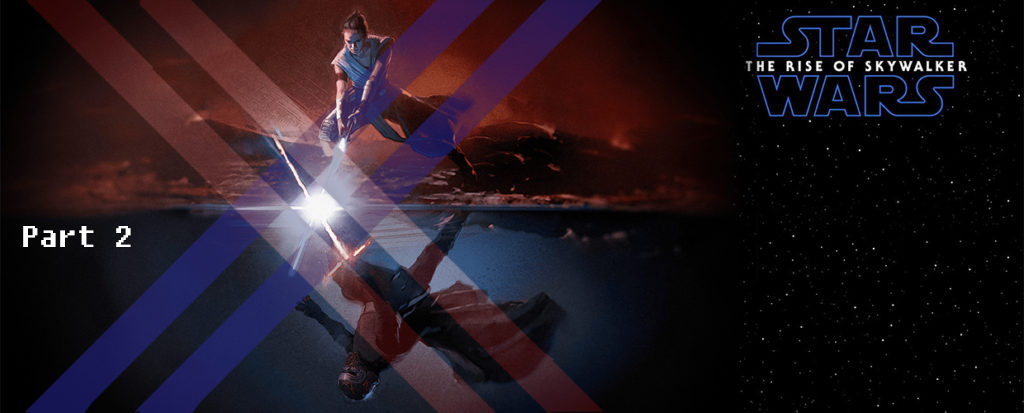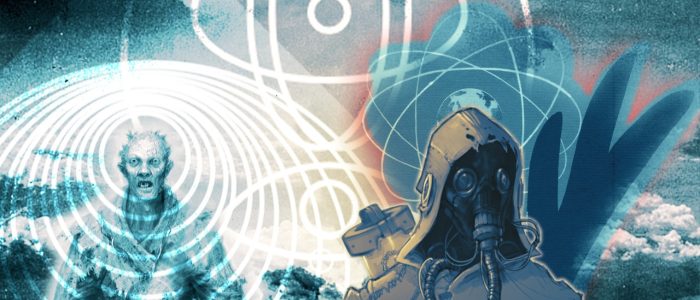Star Wars: Rolling a 1 on writing a story (PART 2)

Star Wars: Rolling a 1 on writing a story (PART 2)
Star Wars has always been about the fight against the dark side, about overcoming personal struggles and sticking it to the Man.
In line with the ethos of Star Wars, we find that Finn was someone who broke the chains of his past, working past not only his hardcoded training and trauma, but also working against an unsympathetic, cruel system. In many ways, the Sith empire is pretty fascist in its style of leadership and discipline, in that it emphasises unity but also does away with differences altogether, overemphasis on obedience, and makes life and death decisions the key sword hanging over the necks of the people.
the movie went from a coloured lead with a white woman- a pairing never seen before in Star Wars- to forcing her character to be paired with a mass murderer who called her a nobody, reducing her sense of self to nothing, and using her to gain power in his own organisation. his alliance was that of a use value, and to her, he used her as a stepping stone for power itself. While this does satisfy the criteria that the Sith are power hungry at all costs, the meta angle is much more important.
And Star Wars opted to change that due to the meta angle is that there was a lot of racist fan pressure to change the way the movie was playing out. It took that very real struggle for Black Fans, for people of colour and rehashed the whole saga back to its very white centric roots.
The problem is not that this wasn’t a problem- indeed, the first two trilogies were not very diverse. It was that the context had changed and the fans had, for years, wanted a change of pace, scenery and characters.
Star Wars The Last Jedi (TLJ) has, as we have already covered, took too many risks with the franchise, which many embraced and still more did not. However, we ascertained that Star Wars The Rise of Skywalker (TROS) chiefly ignores the ideas, concepts and direction introduced in TLJ. TROS goes, instead for its own style of story, which doesn’t really exist. We have already covered how TROS re-introduced the “force bond”, now called Force Dyad.
This is obviously in direct contrast to the previous movie, where Rey herself severs the connection.
Why was it “The Force Dyad” introduced again?
At some point someone felt the need to “keep the romance alive” as one fan sarcastically put it. With Rose and Finn seemingly romantically involved, Rey could not be left alone by her lonesome, and it was deemed that she should be paired again with the villain.
From a story perspective, it makes zero sense for this to happen. The whole plot seems to be done and dusted.
It seems it was reintroduced to ‘spice things up’. However, here is the thing: salt and spice cannot save a dead-end romance. It isn’t even a romance- they practically try to murder each other at every opportunity!
Why wasn’t she paired with Finn?
It would have been interesting to see, at the least, a love triangle develops between the three characters. Finn and Rey already have an established history, and so do Rose and Finn. the ache of romance, the pain of choice, the possibility of hurt feelings is all there potentially, and ready to be implemented. Furthermore, love can and is a guiding force in Star Wars, becoming both the reason for a great fall (Darth Vader comes to mind) and also great triumphs (Star Wars Rebels and Clone Wars have prominent instances).
The idea of sacrifice for the women and the man, the fact that at the end of the day he cares for both of them, and that in the end it’s a fight to win against evil rather than a fight amongst themselves, propels the narrative forward in a way that would make the ending and the build-up much more personal and high stakes than just “Evil man will destroy universe so we got to stop him”.
Racist Fan backlash
It seems the main reason was that Finn, and later Rose, became the ‘anomaly’ in Star Wars fans as regarded by the fandom, where the status quo was upended. The status quo was normally that the non-white characters were aided by an often-disposable side character that could be an alien or non-white. The presence of Finn also upended the romance angle, as now the white male was the villain, and the woman now the deuteragonist to Finn, which was unique in the history of Star Wars.
So, fan backlash ensued and the unique angle in Star Wars history was dropped in favour of an unconvincing, cookie cutter attempt at a pairing that barely resembled feelings of romance. And Finn was side-lined.
TROS not only makes it clear that Finn, the original hero, doesn’t matter, but also that only white central cast matter. Finn and Rose’s trauma and ambitions are put aside… for accommodating a poorly thought out narrative that doesn’t really have a satisfying conclusion or makes a modicum of sense.
The point is that the executive decisions behind the scenes of the Star Wars movies seemed to care more for not offending, allegedly, their white viewers than telling a good story that respects its characters, and the metanarrative of PoC and Black positive representation.
The tragedy of narrative inconsistencies
It is already abundantly clear that many of the inconsistencies in the story and characters can be explained away. It is quite simple; The Rise of Skywalker is a sequel without a history.
It takes what it wants from The Last Jedi without accepting it as canon.
JJ Abram’s film shoved in some story into Rey’s origins, while insisting it hadn’t
Luke’s sacrifice was considered null and void, with Lando Calrissian (out of nowhere) being the spark that brings the rebellion together. Furthermore, the X Wing, a previously derelict spacecraft, was magically made functional despite the former state being a means of a self-serving exile, therefore also rendering Luke’s own exile essentially meaningless.
Snoke was rendered meaningless and impotent as a character, revealed to be Palpatine’s creation. This is just… bad writing. Holdo’s epic manoeuvre was called lucky, and Rey and Kylo’s bond being magically unbroken despite the very final ending of TLJ.
The story has its moments of triumph, indeed, but they seem to be following their own its own path, and adhering to the rules of a past that never was. It seems TROS wanted to make its own impact, on its own, without having to be bogged down by ‘expectations’.
And that itself is the real problem: Ever since the first movie of the new Trilogy, the Force Awakens, released, fans had expectations that were unlike the ones from earlier.
The added inclusion of a non-white main character, a white villain, and a more focus on PoC heroes meant that DIVERSITY and good representation required equally good stories.
We have already covered how there was a massive backlash against this from white fans who were used to seeing white-centric Star Wars movies, and how Kelly Marie Tran (who played Rose) was bullied off social media for her role by racist fans.
The Folly of Palpatine’s return
Bring back Palpatine is, to be quite frank, a cheap move; this is something mentioned by fans too. By bringing back Palpatine, not only were Kylo and Snoke’s characters without agency but also that Palpatine’s return felt like going through the motions again, as he was already a villain that was not only established, but also soundly defeated.
Snoke and Kylo’s relationship was unique, and the tension, teachable moments, and Kylo’s own (villainous) growth meant that a new type of pairing would form.
Palpatine’s return, however, served to bring back the same old Palpatine vs Darth Vader conflict. It sadly did not serve its purpose to offer something new, being unwanted, used, and unable to fit the context of the new trilogy.
Furthermore, it seems that in favour of shock value, the team at Disney decided to reconnect the force connection between Rey and Kylo. this serves no connection other than to artificially increase the stakes.
Palpatine’s survival is glossed over with a few clumsy lines of dialogue. His powers make no sense, seeming to exist for the spectacle than accuracy. In Short, Palpatine seems to have been brought in at the minute for a very artificial overpowered ‘bad guy’ in order to cover up the fact that apart from TROS, there were no other high stakes villains.
These two are mentioned together because they are both, at the end of TLJ, done deals- Palpatine was killed by Darth Vader, and the force connection between Rey and Kylo was forcibly severed.
It just isn’t good writing; all in all, it seems that TROS, in an effort for an epic finale, managed to only flounder and fall apart. While the movie itself is a veritable spectacle of special effects and superb cinematography, the story is an inconsistent mess, a self-aggrandising tale that achieves little more than attempting to make the spectacle believable.
Kylo’s fake redemption
Kylo Ren is consistently murderous and villainous, sanctioning the destruction of entire planets and killing hundreds of Rebels personally. His kill count is frankly very high, given he personally slaughters dozens of rebels and innocents, orders entire villages, and endorses the actions of his Order. He personally leads raids and attacks on rebels in the air and the ground. He even killed members of his own family and personally oversaw lethal strikes on the Rebels. He is the quintessential villain; tall, intimidating, and cruel. His mastery is terrifying, his mind games are nigh impossible to resist, and his Force powers are something to behold.
Where he falls short, however, is his inability to completely give in to the Dark side. However, after he murders his own father, and later his own mother (he failed, as she managed to survive), and then his own master, Kylo came into his own. His presence and odd style paired with his terrifying power makes him be taken seriously.
His own struggles to want to come to the Light side are marred by the fact that, after his patricidal act, he decides to try to turn Rey to the Dark side. He does this by preying on her sensibilities and her naivete, using her desire for him to be Good as a means to extend his own twisted version of the truth. He also completely silences and berates her character brick by brick, manipulating her into believing that she is nothing and will amount to nothing. This is his way of gaining the upper hand against the Resistance; with Rey on his side, it would be a major blow to not only their operations but also morale.
And he almost succeeds if not for Rey’s ultimate call to the Light. He then orders her killed along with the rest of the Resistance at the end of TLJ, who are once again in the backfoot during TROS.
Throughout TROS, he is seen as cruel, calculating, and unsympathetic. He gets a new, mysterious master to whom he bows due to a sudden power difference. His own agendas still remain, but he left any pretence of trying to be Good.
And here is where it gets muddy; despite just a Force Projection of his dad, he was still pretty much a villain until the very end.
His alliance against Palpatine was an Alliance of Convenience with Rey, to battle a greater threat than he could handle.
It makes no sense that Rey would save him after mortally wounding him, but given that she did, it also makes NO SENSE WHATSOEVER that Kylo would suddenly turn good by fighting Palpatine.
The reason why is that He had, up to that point, made no effort to repent or undo the damage and murder and mayhem he had caused until that very moment he fought Palpatine.
Sure, his posture had changed, but it did not mean his sins were washed away. His style change was superficial at best.
And this brings us to the supposed redemption; it just isn’t there. There isn’t any dialog or action done by Kylo Ren that indicates a desire to go against his path in life. If anything, he strode faster unto the darkness.
Kylo Ren remains, until his very end, unredeemed; a good deed of helping dispose an ancient enemy did not do much to bring back or earn the forgiveness of the countless lives he had snuffed out.
—
All in all, Star Wars The Rise of Skywalker wanted to be a movie that wanted to be spectacular, introduce its own lore, and also course correct (to the point of stomping over established) the previous film. From one side, it looks like it had too much to say with little time, and perhaps an investment and cuts would have made more sense. From another perspective, it seems the world environment vis a vis racism, especially in the American era of Trump, did a lot of damage. Many fans said they disliked the film for what they did to the series, and that it was worse than the Prequel trilogy. The new trilogy ending in such a way shows that at the end of the day, the corporate word is more important than lore and the satisfaction of fans. The film did flop, and it makes sense. The film valued money and the effort to course correct a little too much, and paid the price. The above analysis also shows that just with Out of Character writing, a franchise can be thoroughly ruined. Special effects cannot save bad writing, after all.




